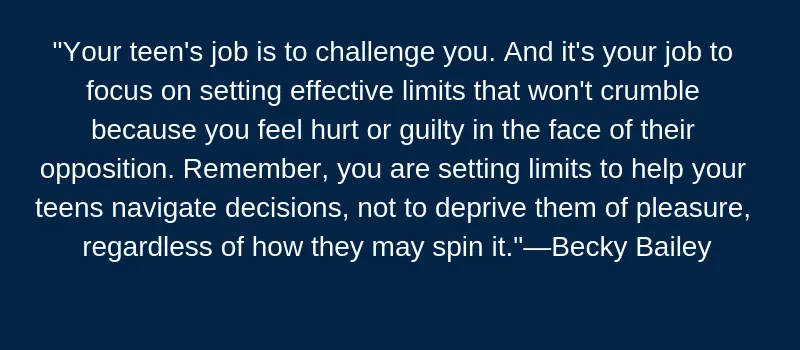Your teenager commits an infraction. You get angry. You dole out a punishment in the heat of the moment. You’re grounded! No video games for a week! Extra chores! Your teenager pushes back. You waver. Then feel regret so you back down. Does this sound familiar?

It’s normal to struggle with disciplining a teenager. So, we asked Becky Bailey, Ph.D., psychologist and developer of the Conscious Discipline program, how parents can use her strategies to more effectively set limits for their teenagers.
Conscious Discipline is based on the idea that parents can develop discipline with their teenagers rather than impose discipline on them.
Intrigued? We certainly were.
Say your teenager has violated a limit, like breaking curfew or texting at 2 a.m.
9 Steps for Applying Conscious Discipline
1. Compose yourself
You must stay calm, even if that means telling your teenager you need time to calm down. “When you dole out a punishment while you’re upset, your teenager will perceive the limit as controlling rather than as a way to help them be successful,” says Bailey.
2. Take back your power
Parents are in charge of their inner state; teens are in charge of their inner state, notes Bailey. You are not making them angry, and they are not making you angry. Instead you are both making the choice to feel angry. You can reclaim power with your words. Try saying, “I’m going to take away your phone at night” instead of, “You’re making me have to take away your phone!”
3. Focus your intention
You need one intention: to help your teen make decisions that will ensure safety (physical, emotional, academic, social, and financial). Dispose of any idea that you will make them behave or make them happy. Also, dispose of any illusion that they will accept your rules without a challenge. These are parenting myths.
4. Focus on what you want to occur
Take curfew. What you want is for your teenager to be home at a reasonable hour. Work with your teenager in advance to define what “reasonable” is for that event. Conclude with stating the limit and the consequence in very specific terms. For example, “You must be back home no later than 11 p.m. or you will lose access to the car.”
5. Stay calm when your teen challenges the limit
Stay calm even though your teenager will challenge the limit. This is the hard part. When your teenager pushes back, says Bailey, repeat your teenager’s choices for this particular event: “You can go to the party and be back by 11 p.m., or you can stay home. Which would be best for you tonight?”
6. Set a consequence and deliver it when necessary
If your teenager doesn’t comply with the limit, resist the temptation to lecture or lose your composure. Reacting with anger diverts attention from the action to you—the mean, angry, unfair parent. However, if you dole out the consequence with some empathy, your teens may leave the situation with angst over the mistake instead of angst over your negative reaction.
In the curfew scenario, a parent could say: “Our agreement was 11, but you came home at 11:30 without calling. I worry that you are not safe when you disregard our agreed-upon curfew. Next time, you will not be able to drive the car. You can choose between being dropped off and picked up at the party, or not going at all. Then, I will know you are safe and home at the correct time.”
7. Teenagers should help establish consequences
When setting agreements, visualize a fence around the issue in your mind. For example, if the issue is time spent on social media, explain your concerns. Your teenager may rush through homework to get on social media. Or your teenager may stay up late into the night on social media.
Define the broad guidelines (fences), and then discuss the details. Once they have shared their own priorities (I want to be on social media because my friends are there too), the next step is to negotiate. You may suggest a phone basket where everyone—including parents—places phones at a designated hour each night. If possible, come up with consequences for infractions together. “When agreements are created together, the policing of consequences will be considerably less,” says Bailey.
8. Again, do not dole out consequences when you are upset
“Never create consequences during or directly after highly emotionally charged times,” says Bailey. “Wait several hours or until the following day to discuss your agreement and what was broken. The goal is to make the breach an opportunity to teach them, not nail them.”
9. Employ consequences that are reasonable
“Consequences are about teaching, not punishing or rescuing,” says Bailey. “The best consequence is a natural consequence. Again, focus mainly on how you deliver the consequence. At emotionally-charged times, we give our teens a free pass. When we yell and threaten, they respond by saying that we are picking on them. The consequence then essentially becomes about our upset, not their behavior. In your delivery of a consequence, avoid redirecting your teen’s focus to you by:
- Stating consequences in a clear, calm, and assertive voice without shouting.
- Creating consequences that are respectful, reasonable, and related to the offense.

“Late for curfew? Move up curfew an hour for the rest of the month,” suggests Bailey. “Returned the car without refilling it with gas? Remove car privileges for the week. When your consequences meet the above guidelines, you are heading in the right direction.”





